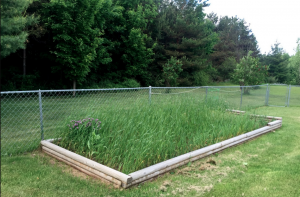You found a spot in the yard that is perfect for a garden bed, but …
Some of the common problems most people face when starting a new garden.
- You don’t have a truck to haul the lumber with.
- You lack the proper tools or knowledge to design, measure, cut and assemble the garden beds.
- You don’t have the time to build the garden beds yourself, and hiring a carpenter to build your garden beds will be very expensive.
Why most 90% raised garden beds fail during the first year
- Low beds are too hard to maintain and keep weeded.
- People do not keep adding fertilizer to the beds.
When plants grow they require fuel( nutrients they find in the soil) to create the vegetables you eat. As the fuel in the soil is used up plants struggle. most people do not invest the time to keep applying nutrients to the soil during the growing cycle. - High quality organic fertilizers are expensive easily costing $30 or more for everything you need.
It can also be confusing and complicated. - Traditional low cost bulk fertilizers are bad
Most of the bars of cow or chicken manure compost are basically waste products from big agriculture that they tricked you into buying from them. basically you are paying to help them out with their problem. To me it doesn’t make sense to take wast products from hormone injected animals and use it to fertilize food I am growing for my family. - Most traditional raised gardens can’t protect the garden bed from invasive weeds that will attempt to take over your garden bed
That is why we set out to design the composting garden product
We set out to create a sustainable garden that will work for amateurs or experts.
Simple and sustainable way to garden
- Fits in to small spaces requiring only 16 sq. ft. of space for its footprint.
- blocks established weeds
- easier to tend to than a low garden bed.
- Help reduce landfill waste and lets you easily practice in-place composting.
- Let’s you create you own free organic compost, that continually feeds the plants. When it is easier for the plants to find the nutrients they need they can spend more time growing and producing for your family.
- At the end of the growing season the plants can be cut up and re composted to form the fuel to help the next generation.

